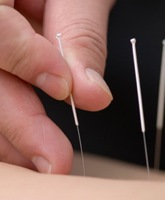What can acupuncture be used for?
Many people come to acupuncture for help with specific symptoms or to relieve specific pains. Some use acupuncture because they feel generally unwell but have no obvious diagnosis. Others choose acupuncture simply to enhance their feeling of wellbeing.
Acupuncture is considered suitable for all ages and can be used effectively alongside conventional medicine.
Acupuncture Research
Acupuncture has been scientifically proven beyond any doubt to treat conditions such as dental pain, nausea and vomiting, as well as giving temporary relief to pain associated with osteoarthritis of the knee, and tension-type headaches. By clicking on the links to the right you will be redirected to the British Acupuncture Council website where there is detailed information on the acupuncture research into other conditions.
However, not all this acupuncture research is universally accepted and in some cases there may be a division of scientific opinion arising from it. Feel free to give me a call if you would like to talk about any condition not listed above.
So much acupuncture research is currently going on into acupuncture that the British Medical Journal (BMJ) is now publishing a quarterly companion volume dedicated purely to acupuncture research called Acupuncture In Medicine (AIM).
In 2009, the National Institute for Clinical Excellence (NICE) recommended that acupuncture should be made available on the NHS as a cost-effective short-term treatment for the management of early, persistent non-specific lower back pain. The NHS website has a page about the evidence for the effectiveness of acupuncture.
The World Health Organisation (WHO) website even has an acupuncture research page called ‘Acupuncture: Review and Analysis of Reports on Controlled Clinical Trials’.
Because traditional acupuncture aims to treat the whole person rather than specific symptoms in isolation, it can be effective for a range of conditions. Western medicine is reductionist in its approach; it zooms in on individual symptoms, gives them names, and tries to fix them. The Traditional Chinese Medicine approach is to zoom out and collect a myriad of facts about how a person is functioning.
In this way, practitioners of Traditional Chinese Medicine are able to help restore balance and promote physical and emotional harmony, treating any imbalances at the root. This approach also means that each patient’s treatment plan will be different.

Feel free to call and ask me about other patients’ experiences to give you an idea of what to expect. Many people return to acupuncture again and again because they find it so beneficial.
To read about how previous clients have felt I have helped them, click on the Testimonials button.
If you have a medical condition I will encourage you to take independent medical advice before receiving acupuncture.
